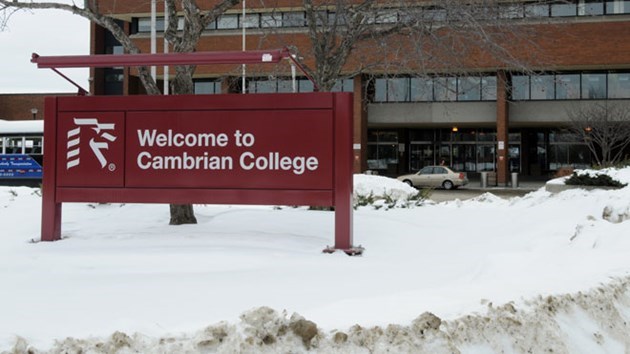Cambrian College has about $50 million worth of deferred maintenance — repairs it's been unable to get to — thanks to the chronic underfunding of the province's college sector, said Cambrian's president, Bill Best.
He made the remarks in the wake of the release of a report put out by Colleges Ontario last month that says underfunding of the province's colleges has reached a “breaking point.”
The report, written by PwC Canada but commissioned by the organization representing all public colleges in the province, says colleges face what could be a cumulative $1.9-billion shortfall by 2024-25.
Since 2007-2008, the provincial funding for colleges' operating costs — in real dollars — has decreased each year.
Ontario’s demographics also mean the traditional pool of college-age population will decline across the province, with colleges in the north expected to experience the largest declines.
But Minister of Advanced Education and Skills Development Deb Matthews told the Globe and Mail last month that the province won't bail the colleges out.
She said recent changes to student loans and grants will encourage more mature students to go to college, making up for shrinking populations of traditional college-age students.
“The issue of demographic change is real,” Matthews told the Globe. But “the changes to [financial aid] mean there is a huge potential … for more participation from indigenous students, from mature students.”
Cambrian always aspires to put the needs of students first, as it should, Best said, but with the shortage of funding, maintenance projects at the 50-year-old campus usually get put on the backburner.
“Every year, we invest significant dollars to make that (putting students' needs first) happen,” Best said.
“However, that comes with the choice of not doing other things. So, for instance, by prioritizing that in our budget process, we actually continue to increase our accumulated deferred maintenance.
“We only do the extreme or most critical elements. We're only one deferred maintenance significant event away from making sure that we can do what we need to do in the classroom.”
The province also recently capped tuition fee increases at three per cent per year, which poses a dilemma for post-secondary institutions. The PwC report says tuition fee increases should instead be at four or five per cent.
“Tuition is one of the revenue streams that we have to deal with making sure we can deliver the quality education experience we have,” Best said.
But if he were going to propose a solution, he'd like to see an increase in the colleges' general operating and maintenance grants. “If we're able to deal with these other issues, the cap is not a big deal,” Best said.
One of the ways Cambrian has attempted to deal with the lack of funding coming from the provincial coffers is bringing in international students. It's also become more aggressive about recruiting domestic students.
“We successfully doubled our international students on campus in the last two years,” Best said. “We actually have 406 international students. When I arrived (in 2014), it was less than 200.
“As shrinking demographics occur, to maintain our enrolment levels, bringing students from around the world is part of that strategy we have.”
Collège Boréal president Daniel Giroux said the Francophone college doesn't have the same kinds of issues with deferred maintenance as Cambrian, as it's only a little more than two decades old.
But the chronic underfunding outlined in the PwC report is still having an impact, he said.
“The last thing any college wants to do is affect the students,” Giroux said.
“We want to make sure we have high-standard services in the classroom. But if something is not addressed with the funding, at a certain point there's going to be a breaking point where you just cannot continue to offer those quality services.”
In a case of unfortunate optics, colleges are complaining about underfunding in the wake of a public spat with the province about large pay hikes proposed for senior administrators at some of Ontario's colleges.
The situation came about after a wage freeze imposed in 2012 on public sector non-union staff was lifted.
Ontario colleges hired an external firm to study the salary issue, and the report proposes a salary framework based on college size. The Globe and Mail reports some presidents could receive pay hikes of 20 to 40 per cent annually.
But Cambrian board of governors chair Dave McNeil said the problem lies in that some colleges went outside the framework's salary range proposals.
“Cambrian and Collège Boréal made sure that we followed the guidelines, and the salary range for that guideline,” he said. “The salary range there was a base salary of $270,000 to $320,000.”
